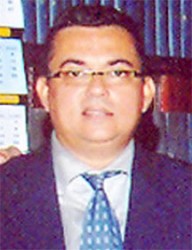Glenn Hanoman, the lead Counsel for the Walter Rodney Commission of Inquiry (CoI), says the decision by the new government to only grant one final sitting was not well thought out and is far from practical.
“I agree that it [the CoI] was used for political purposes and propaganda and a lot of money was wasted or even stolen but let us wrap it up the right way,” Hanoman said, when asked for a response to Cabinet’s decision
Minister of the Presi-dency Joseph Harmon, at a post-Cabinet press briefing last Wednesday, also announced that the commission will be given one month in which to present its findings to the president after the final sitting.

Members of the APNU+AFC government, which won the presidency and a parliamentary majority at elections last month, have repeatedly expressed disfavour with the CoI given the amount of money spent so far and the fact that much of the evidence received so far is based on hearsay information.
Attorney General Basil Williams had previously said that $324M has so far been spent on the commission’s hearings, including a US$7,300 monthly fee paid to freelance journalist Shaun Samaroo to report on the inquiry and produce a book and documentary on the findings.
Hanoman on Saturday told Stabroek News that no one has made contact with him. “I have tried to contact the powers that be to find out what is going on. I don’t know anything…,” he said, while explaining that everything that he knows about the CoI’s future is based on media reports.
He stressed that he can understand why the new administration wanted to wrap up the inquiry “but I don’t think that they have thought it through properly. It is a pity they did it without seeking the proper advice from the people in the commission.”
According to Hanoman, in order to wrap up an inquiry there are certain procedures that have to be followed. Further, he spoke of letters that need to be sent to persons to give them an opportunity to give their side of the story. He noted that this cannot happen in one sitting. He later explained that the commissioners will need to meet and decide on sending letters and summonses and then announce a subsequent date for hearing those persons. He said that this would require that there be two separate sessions.
Hanoman said that he has no clear understanding as to what “one final sitting” means. “It hasn’t been made clear if it will last one day, one month, two weeks or three weeks”, he said. Since it began its work about a year ago, the commission has conducted a series of sittings that ran for around two weeks on each occasion.
“Things have to be done at the next session in order for there to be a final session. The commissioners got to come and sit and have things done,” he said before again stressing that those who have made the final sitting decision do not understand the procedure involved. For him, two sets of sittings each lasting two weeks would be the minimum time required to properly wrap up the proceedings.
Hanoman told Stabroek News that it is “unfortunate” that there was no consultations as it regards to the workings of the commission and what can be achieved within a certain time period.
“It is a disgrace that so much money was wasted… (but) no one has spoken to me,” he said. “If we want to wrap it up, let’s wrap it up in the right way… I am in favour of wrapping it up,” he added.
According to Hanoman, the Secretary to the commission Hugh Denbow was spoken to. “He is the man in charge of administrative things. If you want to get it done, technically, they need to speak to me,” he, however, pointed out.
Meanwhile, Hanoman informed that there are still a number of important witnesses who are supposed to give evidence and in some cases to complete their testimony.
He singled out Vernon Gentle, Skip Roberts, Norman McLean, WPA leader Dr. Rupert Roopnaraine and a so far unnamed bomb expert. He said that in McLean’s case, he has to return to continue his testimony and there is a lot of documentation that lawyers may want to examine him on.
With regards Dr. Roopnaraine, who has been appointed Minister of Education, Hanoman said that he has promised to take to the witness box once the elections were over. “He is a very important witness,” he stressed.
Rodney, the co-leader of the WPA and an activist who had openly opposed the then PNC government, died in a car near John and Bent streets on June 13th, 1980, after what was thought to be a walkie-talkie exploded in his lap. The PNC–now a constituent of APNU–has long been accused of being behind the killing of Rodney despite repeated denials over the years.
In justifying the setting up of the CoI, the former Donald Ramotar government had said it wished to clear up all outstanding questions surrounding Rodney’s death, although it did not consult the WPA or the main opposition parties on its constitution.





